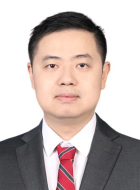
Building Back Better: China’s Policy and Legal Approaches and Global Implications
Amid the ongoing effort to combat COVID-19 worldwide, it is more important and more timely than ever to consider the development of China’s policy and regulatory approaches to ensure a sustainable, resilient recovery. This conference aims to bring researchers from Tsinghua Law School and UNSW Law & Justice together to discuss the policy and regulatory developments in a wide range of fields including international trade law, international investment law, banking & finance law, intellectual property law, corporate law, competition law, environmental law and dispute resolution, focusing on cutting-edge issues faced by China in building back better.
Speakers
Haifeng Deng is Assistant Dean and Associate Professor of Law School, Tsinghua University, China. He is also Vice Director of the Center for Environmental, Natural Resources & Energy Law and Senior research fellow of the CDM Development and Research Center of Tsinghua University. He completed his postdoctoral research at the Public Policy and Management School of Tsinghua University, his doctoral degree in law at the Law school of Tsinghua University and his LLM and LLB at the Law school of Hei Long Jiang University.
Haifeng Deng’s research is focusing on environmental law, natural resources law and energy law. Since 1994, he has joined about 40 important research programs concerning Chinese environmental law, natural resources law and energy law. Currently, he is the standing director of China environmental law research society, the director of environmental law research society of Beijing law science society, the standing director and vice general secretary of environmental law research society of China environmental science society and the formal expert of the official version of the legislation on Chinese Climate Change Arrangement Law.
Guobin Cui is the Professor and Director of the Center for Intellectual Property at Tsinghua University Law School. He was the Associate Dean for International Affairs and Academics(2016.7-2019.7). Professor Cui earned his Ph.D. in law, LL.M., and B.Sc. in Chemistry from Peking University, and his second LL.M. from Yale Law School. His scholarly interests include intellectual property, antitrust, property, and law and economics theory. He teaches Intellectual Property Law, Patent Law, IP Licensing, and Chinese Civil Law. He has published more than 20 law review articles and two popular casebooks, “Patent Law: Cases and Materials” (1st edition in 2012, 2nd edition in 2015) and “Copyright Law: Cases and Materials” (2014, Peking University Press).
Before he joined Tsinghua in 2002, he had practiced intellectual property litigation and licensing law in Beijing and Shanghai. In 2008, he worked as an intern for Judge Rader at the U.S. Court of Appeals for the Federal Circuit. He was a visiting scholar at the George Washington University Law School in 2008, the University of Chicago Law School in July 2012, the University of Washington Law School in May 2013, and the University of New South Wales (UNSW) in February 2018.
He also serves as adjunct researcher, the Center for Judicial Protection of Intellectual Property, the Supreme People’s Court of China; Legal advisor, Beijing High People’s Court; Specialist Juror, Beijing Intellectual Property Court; and Legal advisor, the People’s Court of Haidian District of Beijing.
Weihuan Zhou is Associate Professor and Co-Director of the China International Business and Economic Law (CIBEL) Centre at the Faculty of Law & Justice, University of New South Wales (UNSW) Sydney. His research explores the most current and controversial issues in the field of international economic law, particularly the nexus between international trade law and China. His latest book (with Henry Gao), published by the Cambridge University Press, offers a thorough and systemic analysis of China’s ongoing reforms of state-owned enterprises and the ways to tackle China’s state capitalism under the world trading system. His work has been cited widely, including in reports of the European Parliament, the Parliament of Australia, US Congressional Research Services and World Economic Forum. He is currently co-Secretary of the Society of International Economic Law (SIEL) and editorial board member of the World Trade Review and the Journal of International Trade Law and Policy.
Chair
Simin Gao is Associate Dean and Associate Professor at the Law School of Tsinghua University, and she got S.J.D from Upenn law school. She is the vice chairman of Bejing Banking Law Association and International Economic Law Association, and a member of Chinese Security law Association, Banking Law Association and Next Generation of International Insolvency Institution. She brings interdisciplinary perspectives to a wide range of emerging issues that encompass bankruptcy law, corporation Law, financial law, law and economic and comparative law. She has authored several publications on Bankruptcy Law, Financial Law and Regulation, which appeared on the law journals in China, U.S. & EU. She received some academic awards including the Gold Medal of International Insolvency Study by the International Insolvency Institution (2017).
Closing Remarks
Jun Long is the Associate Professor as well as Associate Dean of International Affairs of School of Law, Tsinghua University. He earned his LL.B (2006) and Ph.D in law (2011) from Tsinghua University. He was a Joint Ph.D student at Hokkaido University from 2009 to 2010. With Civil Law as his main research interests, Associate Professor Long was the Member of the Working Group for the Legislation of Civil Code (1 of only 2 scholars) from 2017-2020. He participated in the overall process of the legislation work of Civil Code of the People’s Republic of China.




